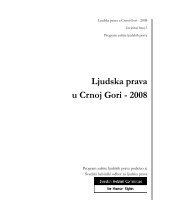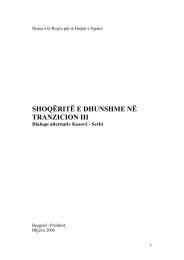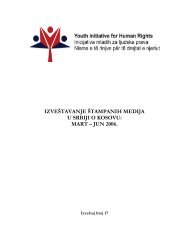Implementation of Transitional Laws in Serbia 2006
Implementation of Transitional Laws in Serbia 2006 - Archive
Implementation of Transitional Laws in Serbia 2006 - Archive
- No tags were found...
You also want an ePaper? Increase the reach of your titles
YUMPU automatically turns print PDFs into web optimized ePapers that Google loves.
<strong>Implementation</strong> <strong>of</strong> <strong>Transitional</strong> <strong>Laws</strong> <strong>in</strong> <strong>Serbia</strong> <strong>2006</strong>In the Constitution <strong>of</strong> 1990 <strong>Serbia</strong> was def<strong>in</strong>ed as the state <strong>of</strong> „all citizenswho live <strong>in</strong> it“ 25International RelationsArticle 16The foreign policy <strong>of</strong> the Republic <strong>of</strong> <strong>Serbia</strong> shall be based on generally accepted pr<strong>in</strong>ciplesand rules <strong>of</strong> <strong>in</strong>ternational law.Generally accepted rules <strong>of</strong> <strong>in</strong>ternational law and ratified <strong>in</strong>ternational treaties shallbe an <strong>in</strong>tegral part <strong>of</strong> the legal system <strong>in</strong> the Republic <strong>of</strong> <strong>Serbia</strong> and applied directly.Ratified <strong>in</strong>ternational treaties must be <strong>in</strong> accordance with the Constitution.As <strong>in</strong> the case <strong>of</strong> the Constitutional Charter <strong>of</strong> the State Union <strong>of</strong> SCG 26 ,<strong>in</strong>ternational relations are regulated <strong>in</strong> Article 16. However, unlike theConstitutional Charter, which stated that „Ratified <strong>in</strong>ternational contractsand generally accepted rules <strong>of</strong> International law have precedence overthe laws <strong>of</strong> <strong>Serbia</strong> and Montenegro and the legislature <strong>of</strong> its constituentstates“ 27 , a sentence is added here that fundamentally changes the relations<strong>of</strong> <strong>Serbia</strong> towards International law. Namely, <strong>in</strong> the f<strong>in</strong>al paragraph <strong>of</strong> thisarticle there is a regulation that the confirmed <strong>in</strong>ternational contracts haveto be <strong>in</strong> accordance with the Constitution.The question arises, what happens when an <strong>in</strong>ternational contract is differentfrom the Constitution. The Constitution does not envisage that possibility.It is clear that the Constitutional Court <strong>of</strong> <strong>Serbia</strong> cannot f<strong>in</strong>d articles <strong>of</strong> an<strong>in</strong>ternational contract unconstitutional. On the other hand, it difficult toimag<strong>in</strong>e that parties to a contract will change their document because it isdifferent from the Constitution <strong>of</strong> <strong>Serbia</strong>. The only rema<strong>in</strong><strong>in</strong>g solution isfor <strong>Serbia</strong> to make all the documents contrary to its Constitution <strong>in</strong>valid. Itis not necessary to expla<strong>in</strong> <strong>in</strong> detail where that would lead. In any case, thisstipulation constitutes a legal nonsense and it is impossible to implementit.php?id=122&start=75&nav_id=215343, visited on November 23 rd , <strong>2006</strong>25 The Constitution <strong>of</strong> the Republic <strong>of</strong> <strong>Serbia</strong> from 1990, adopted and entered <strong>in</strong>to force on March 28 th , 1990,Official Gazette <strong>of</strong> RS number 1/90, Article 126 The Constitutional Charter <strong>of</strong> the State Union <strong>of</strong> <strong>Serbia</strong> and Montenegro, adopted and entered <strong>in</strong>to force onFebruary 4 th , 2003, Official Gazette <strong>of</strong> SCG number 1/0327 Ibid, Article 1612











